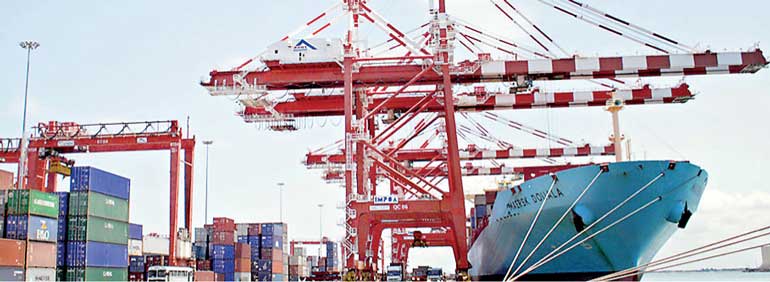Monday Feb 23, 2026
Monday Feb 23, 2026
Wednesday, 19 April 2017 00:08 - - {{hitsCtrl.values.hits}}
 By Charumini de Silva
By Charumini de Silva
Labour action at the country’s first private sector port terminal, South Asia Gateway Terminal (SAGT), has ended after 13 days, dealing a loss of around Rs. 250 million with nearly 30 ships not serviced.
The go-slow campaign by workers, owing to a dispute over the Sinhala-Tamil New Year bonus, began on 7 April but thanks to cooperation from the State-owned JCT and the Chinese-owned CICT, its impact was lessened.
The labour action was suspended on Monday following discussions between the unions and the management.
Following the breakthrough SAGT is busy getting back up to its usual high-productivity benchmarks within 48 hours and normalising its berthing window protocols within this week.
During the go-slow campaign average productivity levels dropped significantly from 30-35 moves per hour to 10-12 moves per hour. The estimated loss of revenue from 4 April-17 April was $ 1.6 million, while the total impact can only be measured in two weeks’ time. The number of ships not serviced is around 20-30, which is equivalent to 30,000 TEUs.
SAGT CEO Erwin Haaze, issuing a statement on the resolution, asserted that they deeply regretted the disruption caused to its customers and expressed gratitude for their support and understanding during the difficult time.
“We are pleased to have gained consensus with our internal stakeholders involved in restoring normalcy of terminal performance in a pragmatic and sustainable way with immediate effect,” he added.
According to Haaze, the workers were disgruntled about the annual bonus and it has been paid in accordance with the Collective Agreement (CA) which was reached about six months ago. The bonus payment structure represents a particular number of months’ salary and is actually the highest to be paid in SAGT’s history, he added.
The disruption caused the diversion of several vessels to the two other terminals at the port.
Haaze also commended the operational collaboration of the Sri Lanka Ports Authority (SLPA), Jaya Container Terminal (JCT) and China International Container Terminal (CICT) in their collective focus on minimising the impact to the Port of Colombo during this time.
During the past two weeks SAGT has diverted 26 vessels to JCT and five vessels to CICT, according to SAGT Commercial and Marketing Manager Dhashma Karunaratne.
The dialogue in the 24 hours prior to the settlement had been very constructive, with all parties determined to find a resolution and end the continued disruption caused to customers and the broader importer and exporter community.
SAGT General Manager - Human Resources Chandana Wijayanama said: “This agreement maintained the sanctity of the Collective Agreement (CA) signed just six months ago. However, it enabled us to accomplish a sustainable outcome based on sensible principles of workforce engagement in a commercially responsible way.”
He pointed out that there is a collective determination by all involved to ensure disruption of this nature does not reoccur.
“That is the most important achievement - to foster an environment conducive to delivering a reliable, consistent and sustainable best-in-class service level to our customers,” he added.
SAGT is the first private stevedoring company in Sri Lanka - with approximately 60% of Sri Lankan share ownership – and commenced operations in 1999, launching the Port of Colombo as global trade’s eminent gateway hub to South Asia.
Today the terminal is one of three operators at the Port of Colombo and continues to offer the international container shipping community a competitive best-in-class service. SAGT is a Board of Investment (BOI) flagship company consisting of four shareholders including John Keells Holdings, APM Terminals, SLPA and Peony Investments (subsidiary of Evergreen Marine Corporation).